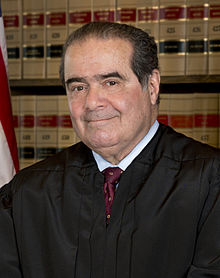President-Elect Trump says he wants to nominate a justice like the late Antonin Scalia to the U.S. Supreme Court. That means a justice who follows the judicial philosophy of “originalism.”
Originalism is the view that we should interpret the Constitution much as we interpret other legal documents—in accordance with the understanding of the people who adopted it. Until the mid-20th century almost every Supreme Court justice was an originalist. Almost every judge still is an originalist as to every kind of document except the Constitution.
During the 1940s President Franklin Roosevelt appointed a majority of justices who disregarded the traditional rules of judging. His “liberal” appointees allowed the federal government to smash through the limits the Constitution had placed on its power. In many cases, they pretended that the Constitution mandated their personal social views.

Justice Scalia
Some presidents have tried to return the Court to responsible judging by appointing originalists to the Supreme Court. Once on the Court, however, most have turned out not to be originalists at all. Several have proved to be fervent judicial “liberals.” By contrast, liberal appointees have invariably remained liberal.
There are a number of reasons for this asymmetry, including the perverse incentives prevailing in Washington, D.C. My own view is that we should adopt a constitutional amendment moving the Court to a more centralized location, such as Kansas City or Salt Lake.
In the interim, the president simply has to be very careful during the selection process. That means applying at least six selection criteria:
Rules for Selecting a Justice
First: A potential nominee for the Court has to be really smart, not just pretty smart. A mid-level college football player is pretty good at football compared to the general population, but wouldn’t cut it in the NFL. Similarly, a person with an IQ of, say, 125 is intelligent, but not intelligent enough to succeed in the overwhelming task of returning the Court to its constitutional roots. An object lesson is the career of former Chief Justice Warren Burger. President Nixon put him on the Court to lead it back toward originalism. Burger was no dummy, but he just didn’t have the intellectual firepower for the kind of job he faced.
Second: The candidate should have graduated from a law school other than Harvard or Yale. This rule conflicts with the first criterion to a certain extent because law school attendance has become so hierarchical that most aspiring law students smart enough get into Harvard or Yale choose to attend. But law schools mold legal minds. These two left-leaning, predominantly anti-originalist, institutions have had a near-lock on the Court of late. It’s time for some different perspectives.
Third: When a political candidate seeks my support by assuring me he’s conservative, I respond, “Anyone can say that and a lot of candidates have. Show me your scars!”
The point is that it is not enough for a potential Supreme Court nominee to say he or she is an originalist. He or she has to have waged legal war for the cause. The best proof is a paper trail of articles, court briefs, or judicial opinions arguing for originalist results.
Fourth: Good judges can come from practice, the academy, or the bench. On balance, though, bench experience is best—particularly the trial bench. In trial court, lawyers and judges learn about the real world. A candidate with experience in practice, academia, and on trial and appellate courts is best of all.
No More Coastal Candidates
Fifth: This next Supreme Court pick should come from the American heartland, not from the East or West Coasts. Since Sandra Day O’Connor of Arizona retired, the Court has been utterly dominated by New York, New Jersey, and California, and, of course, metro-D.C. We need more justices from states where agriculture is a principal activity or where the state’s economy is smothered by the heavy hand of federal land ownership. They will better understand why the Constitution limited the size and scope of the federal government.
Sixth: The candidate should not be too young. In recent years, presidents have tended to select young nominees in the hope they will serve many years on the Court and prolong the president’s legacy. But a president needs to consider that a younger person may be insufficiently tested. In my view, the ideal nominee is in his or her late 50s or early 60s.









